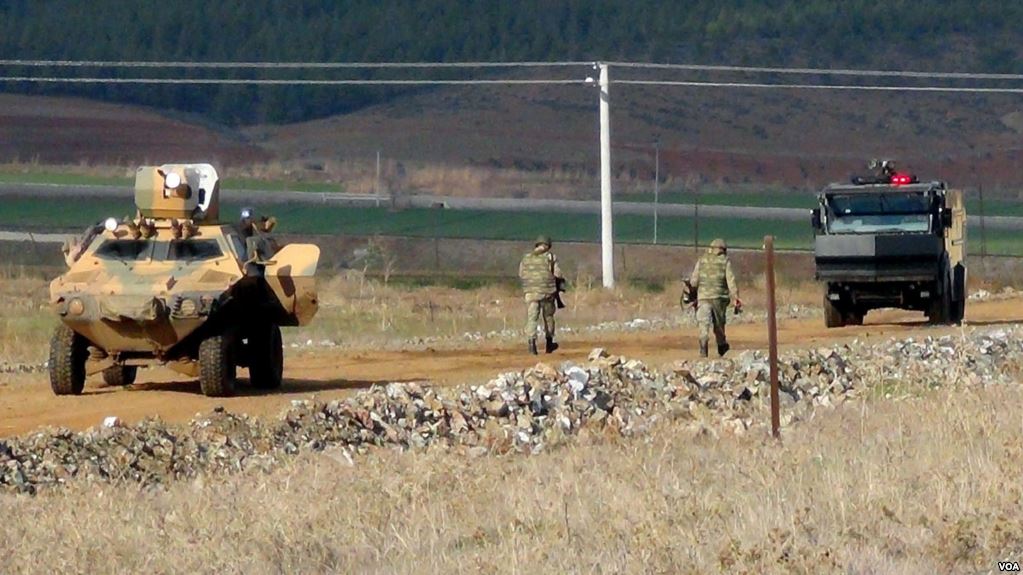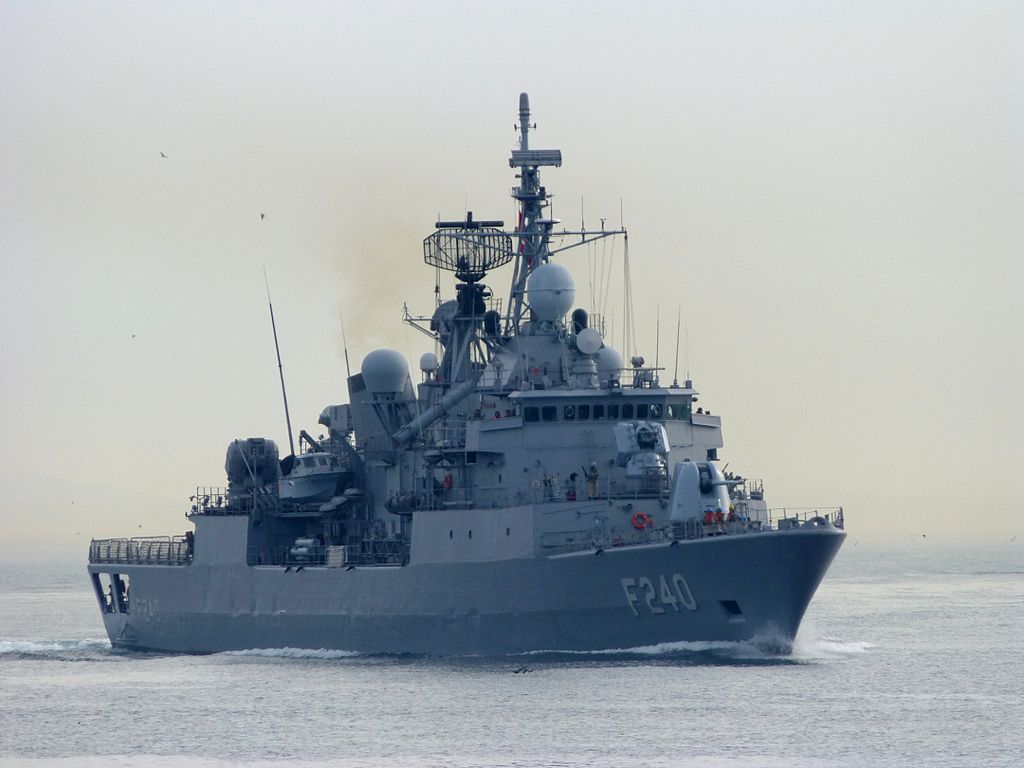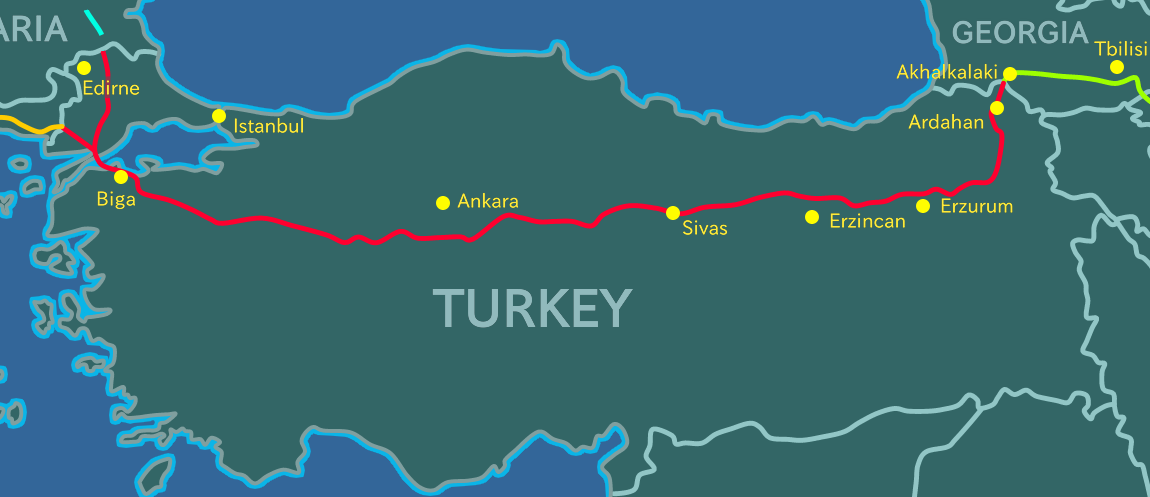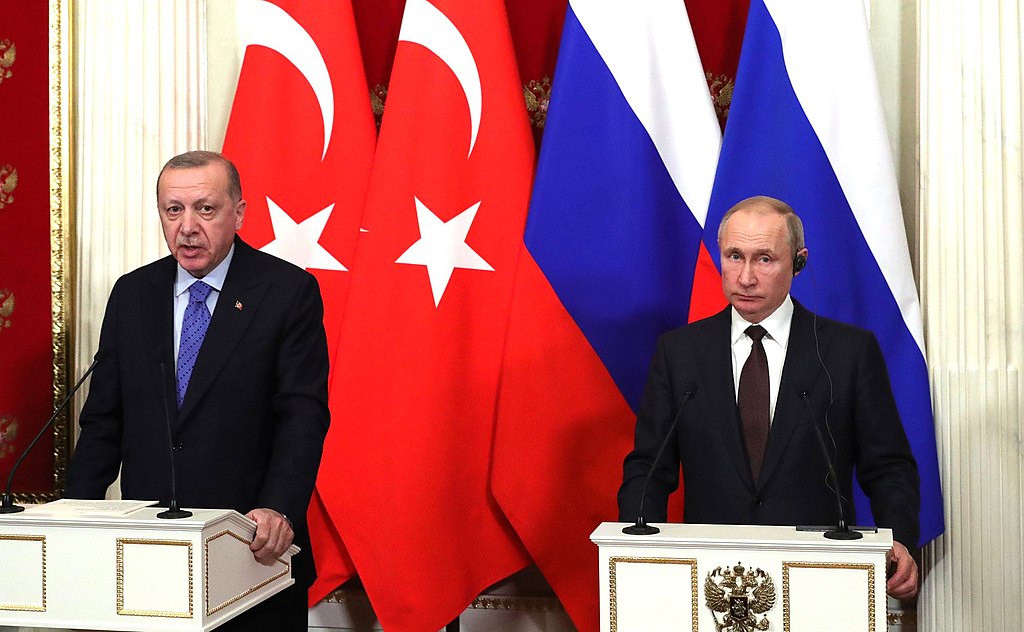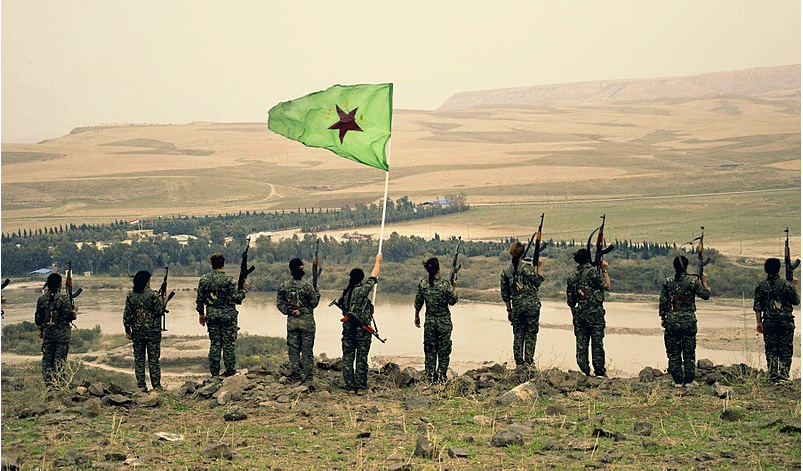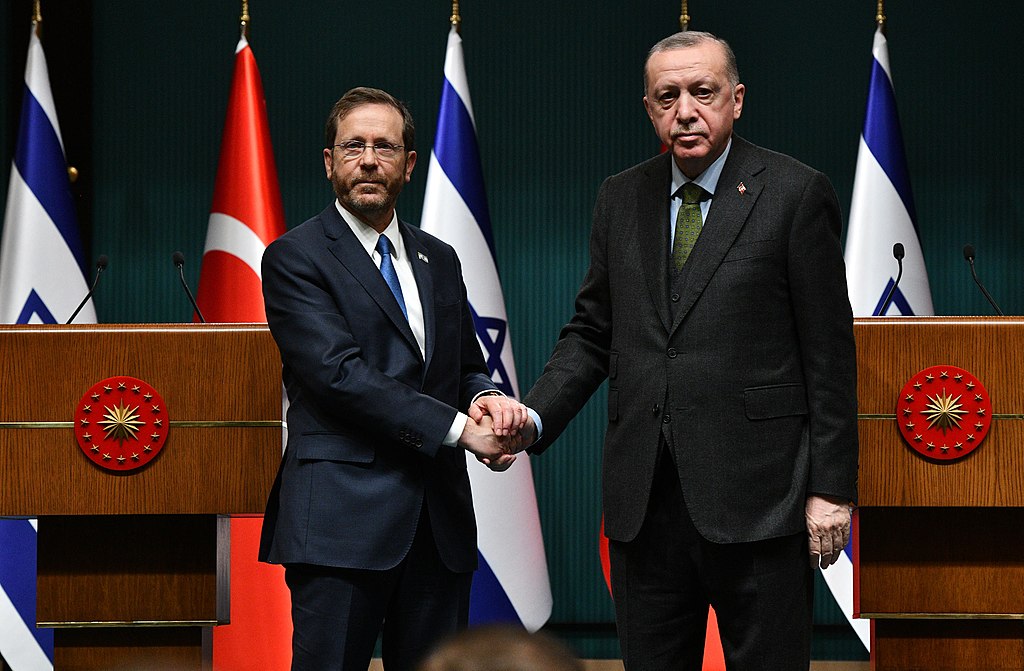
The President of Israel, Isaac Herzog, and the President of Turkey, Recep Tayyip Erdoğan.
“This dual-track rapprochement, along with the aforementioned factors specific to Iraq and Syria, has created the perception in Iran that a regional front might be in the making… with the primary aim of confronting Iran…”
Turkey’s activities and recent rapprochement with regional actors have created a perception in Iran that a regional front might be forming against Iranian interests. On 27 June, Iranian Foreign Minister Hossein Amir-Abdollahian visited Turkey amid concerns that Turkey is strengthening relations with Iran’s main regional rivals, Saudi Arabia and Israel. The Iranian Foreign Minister’s visit followed on the heels of visits by both Saudi Crown Prince Mohammed bin Salman (MBS) and Israeli Foreign Minister Yair Lapid. The accompanying articles analyze the regional power competition through these visits. According to the excerpted article from security news focused al-Monitor, Turkey’s improved relations with Israel worry Iran because Turkey and Israel have recently had a convergence of interests in countering Iran’s influence in the Middle East, especially in Syria.
The second article from pro-government Turkish daily Sabah states that the visits of MBS and Yair Lapid demonstrate the concrete results of Turkey’s desire to normalize its relations with the regional players and strengthen its role in the regional power balance. The article notes that Turkey’s normalization of relations with regional players is not intended to threaten the interest of third parties, including Iran, even though it might influence the calculations of other players. The article further states that Turkey and Saudi Arabia are likely to repair their relationship quickly and strengthen their cooperation in trade, tourism, construction, energy, the defense industry, and new technologies. Iran’s influence in the region through its proxies and the progress of its nuclear program concern the regional players, especially Israel. Regional dynamics will likely have an impact on ongoing negotiations over Iran’s nuclear program. Ultimately, normalizing Turkey’s relations with Saudi Arabia and Israel will play a significant role in the power balance in the region and help curb Iran’s growing regional influence while ongoing, indirect negotiations continue between the United States and Iran to restore the 2015 nuclear deal.
Source:
Amberin Zaman,“Iran’s foreign minister checks in with Ankara as Turkey courts Tehran’s foes,” al-Monitor (globally read security news site with regionally based reporting),27 June 2022. https://www.al-monitor.com/originals/2022/06/irans-foreign-minister-checks-ankara-turkey-courts-tehrans-foes
Iranian Foreign Minister Hossein Amir-Abdollahian [visited] Turkish President Recep Tayyip Erdogan in Ankara… part of an effort to manage growing tensions between the prickly regional rivals.
Upon his arrival, Amir-Abdollahian said he would be discussing “comprehensive long-term cooperation” between Iran and Turkey with his Turkish counterpart Mevlut Cavusoglu and Erdogan.
In any case friction over Israel, which has deepened as Turkey mends fences with the Jewish state, has taken a back seat to Iran’s other big concerns, observers say. “Syria and Iraq are at the top of the list,” …“Iran is deeply worried about the prospect of a new Turkish military operation, especially if it’s going to involve Tel Rifaat,” Azizi told Al-Monitor. He was referring to the Syrian town south of Aleppo that is close to the Shiite-majority town of Nubl and Al-Zahra that could also act as a gateway allowing Turkey and its Sunni rebel allies to expand their influence around Aleppo…
“From Iran’s point of view, this could be a prelude to the further expansion of the influence of Turkey toward central Syria, enabling it to limit Iran’s influence and create a new headache for the Syrian regime,” Azizi added. Erdogan renewed vows to conduct another military operation against the Syrian Kurds today…
Iran’s other concern is Iraq, where Turkey is trying to limit Iran’s influence in the Iraqi political sphere by facilitating the formation of a unified front composed of the Kurdistan Regional Government and the country’s main Sunni faction.
At the same time, the escalation in Turkey’s military operations in Iraqi Kurdistan has raised concerns among Iran and its affiliated Shiite groups that Turkey may seek to establish a permanent sphere of influence in northern parts of Iraq. Those worries were sharpened by KRG Prime Minister Masrour Barzani’s comments earlier this year about selling Iraqi Kurdish gas to Europe via Turkey to offset supply deficits stemming from sanctions on Russia over its invasion of Ukraine.
But on a wider regional scale, “what worries Iran the most is that Turkey has been improving its relations with Iran’s rivals, particularly Israel and Saudi Arabia,” said Azizi, the Iranian analyst.
“This dual-track rapprochement, along with the aforementioned factors specific to Iraq and Syria, has created the perception in Iran that a regional front might be in the making with the participation of Turkey, Israel and the Arab states of the Persian Gulf with the primary aim of confronting Iran,” Azizi said.
Source: Burhanettin Duran, “Bin Salman ve Lapid Ziyaretlerinin ardından… (In the aftermath of Bin Salman and Lapid’s visits…),” Sabah (pro-government Turkish daily),24 June 2022. https://www.sabah.com.tr/yazarlar/duran/2022/06/24/bin-selman-ve-lapid-ziyaretlerinin-ardindan
…official visits [by Saudi Arabia’s crown prince, Mohammed bin Salman and Israeli Foreign Minister Yair Lapid] were significant because they demonstrated the concrete results of Turkey’s normalization policy and the country’s strengthening role in balancing the regional power equilibrium. It is especially important to note that the normalization process has been shaped by a mutual commitment, as opposed to a request by either party, so that the relevant expectations can be assessed on a rational basis. At the same time, the normalizing parties strive to ensure that their new relationship does not hurt the interests of third parties. Again, each normalization process has its own dynamics and influences the calculations of others.
Indeed, the joint statement points in that direction. Accordingly, the two nations aim to strengthen their cooperation regarding trade, tourism, construction and energy, as well as the defense industry and new technologies.
Having turned over a new leaf in its relationship with Riyadh, Ankara finds an opportunity to play a more active role in the region… Meanwhile, Iran’s proxies and the progress of that country’s nuclear program, which ostensibly can build nuclear weapons, remain a source of concern for the entire region. That situation, in turn, encourages all countries in the region, starting with Saudi Arabia, to become nuclear powers themselves.
Indeed, Tel Aviv is among those capitals in the Middle East, which are most unhappy with Iran’s growing regional influence…
Image Information:
Image: The President of Israel, Isaac Herzog, and the President of Turkey, Recep Tayyip Erdoğan
Source: The Spokesperson Unit of the President of Israel, via Wikimedia,
https://commons.wikimedia.org/wiki/File:Isaac_Herzog_state_visit_to_Turkey,March_2022%28GPOHA1_1042%29.jpg.jpeg
Attribution: CC-BY-SA-3.0 | Uploaded with pattypan

